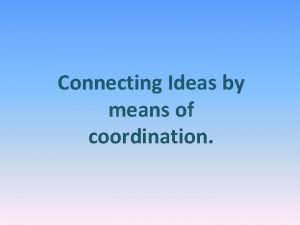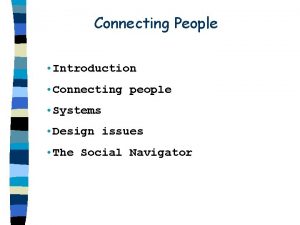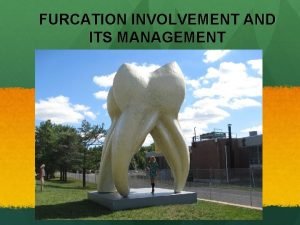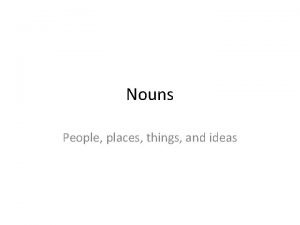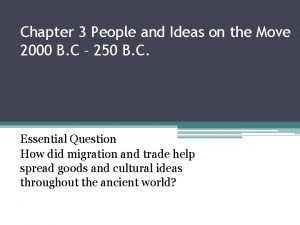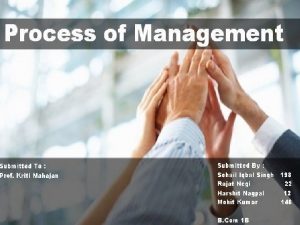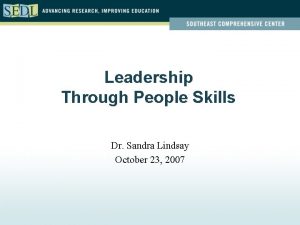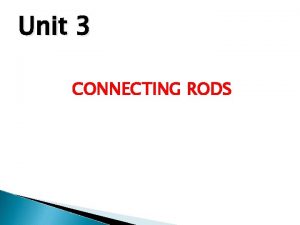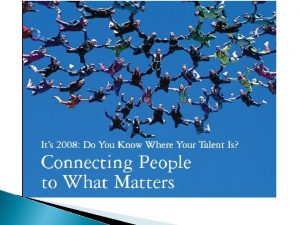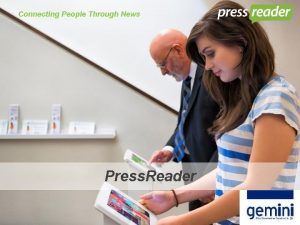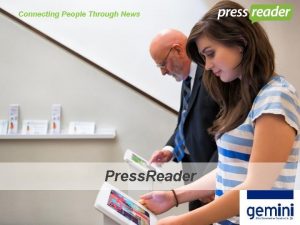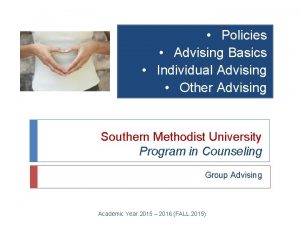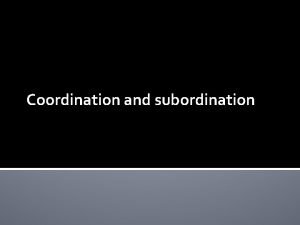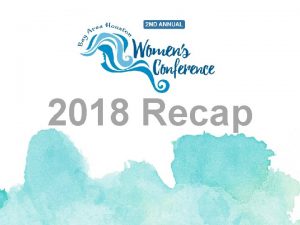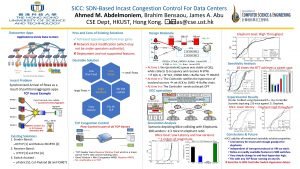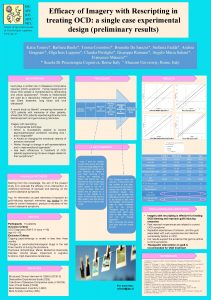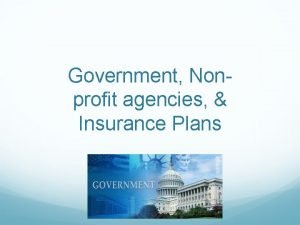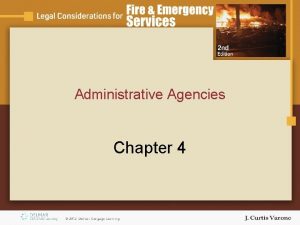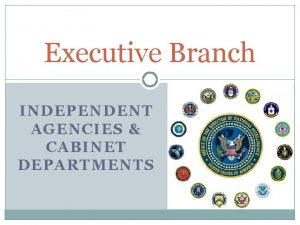The SICC Connecting Agencies People Ideas through Advising


























































- Slides: 58

The SICC: Connecting Agencies, People & Ideas through Advising & Assisting An Orientation to the Role of the SICC Sharon Ringwalt, Ph. D. Early Childhood Technical Assistance Center (ECTA Center) and Mid-South Regional Resource Center (MSRRC) September 7, 2014

Agenda • Welcome and introductions • Overview for the day • Topical discussions: – Stakeholder participation in the SSIP process – SAP/SICC webinars – future issues? – Family and provider participation on the SICC – SICC group on the TA & D Ning site – other options? • Break for lunch • Meet with ITCA and 619 Consortium • Introduction to the SICC orientation slides 12/16/2021 2

Please remember to update the contact information for your SICC Chairs, Co-Chairs and Staff! Make changes on the contact list being circulated today or send information to sharon. ringwalt@unc. edu 12/16/2021 3

Historical Overview of IDEA � 1975 – Congressed passed PL 94 -142 (Education of All Handicapped Children Act) � 1986 - PL 99 -457 ◦ Section 619 (added preschool) ◦ Part H (became Part C) � 1997 - reauthorization = IDEA � 2004 – passed the Individuals with Disabilities Education Improvement Act 2004 � September 2011 – Part C Regulations for IDEA 2004 released 12/16/2021 4

Purpose of Part C of IDEA • To develop and implement a – statewide – comprehensive, – coordinated, – multidisciplinary – system of support and services – for infants and toddlers with disabilities – and their families 12/16/2021 5

Law and Regulations – Pertaining to SICCs • Federal – http: //ectacenter. org/idea. asp • State – varies from state to state 12/16/2021 6

Changes in the SICC Membership – IDEA 2004 � Added new members to the State Interagency Coordinating Council (SICC) & eliminated the Federal Interagency Coordinating Council (FICC). � The SICC shall be composed as follows: ◦ Not less than one member shall be from the agency responsible for the state Medicaid program; ◦ Not less that one member shall be a representative designated by the Office of Coordinator for Education of Homeless Children and Youths; ◦ Not less than one member shall be a representative from the state child welfare agency responsible for foster care; and ◦ Not less that one member shall be a representative from the state agency responsible for children’s mental health. ◦ The authority for the FICC at 644, IDEA 1997, was deleted. � [641(b)(1)(G), (K)-(M) and deletion of the FICC at 644, IDEA 1997] 12/16/2021 7

SICC Membership • In general. --The council shall be composed as follows: v v v Parents. --Not less than 20 percent of the members Service providers. --Not less than 20 percent of the members State legislature. --Not less than 1 member Personnel preparation. --Not less than 1 member Agency for early intervention services. --Not less than 1 member Agency for preschool services. --Not less than 1 State Medicaid agency. --Not less than 1 member Head start agency. --Not less than 1 member Child care agency. --Not less than 1 member Agency for health insurance. --Not less than 1 member Office of the coordinator of education of homeless children and youth. -Not less than 1 member v State foster care representative. --Not less than 1 member v Mental health agency. --Not less than 1 member v Other members. --The council may include other members 12/16/2021 8

Advise and Assist • Advise • Assist – To give advice – To help – To inform – To support – To counsel – To second – To recommend – To attend – To suggest – To aid – To guide 12/16/2021 9

� Advise and assist the Lead Agency in ◦ federal, state, or local policies that the development of policies impede timely service delivery; � Assist in achieving full participation, coordination, and cooperation of all ◦ resolved; agencies of the statewide system, by establishing a process that includes: 12/16/2021 Taking steps to ensure that any policy problems identified are appropriate private and public � Assist in the effective implementation Seeking information about any ◦ To the extent appropriate, assisting the Lead Agency in the resolution of disputes. 10

Duties of the State Advisory Panel/Functions of the State Interagency Coordinating Council SAP (Part B) • Advise the SEA – Of unmet needs – In developing evaluations and reporting on 618 data – In developing CAPs – In developing and implementing policies relating to coordinating services • Comment publicly on proposed rules or regs 12/16/2021 SICC (Part C – sometimes beyond) • Advise and Assist the LA in – Identification of fiscal and other support – Assignment of financial responsibility – Promotion of methods for collaboration – Preparation of applications – The transition of toddlers to preschool and other services (both the SEA and LA) 11

Unlocking the Power of Partnership 12/16/2021 12

LEAD AGENCIES NEED SICC SUPPORT AND PARTNERSHIP MORE THAN EVER Challenge to maintain an appropriate balance between quality and compliance in context of states’ current fiscal situations 12/16/2021 13

How active is your state’s ICC? If not active…. 12/16/2021 14

Steps in organizing an interagency council �Clarify the purpose of the interagency council (does your SICC have a mission or vision statement? ) �Determine the geographical boundaries or service area (is it representative? ) �Define the target population (0 -3, 0 -5, 0 -8? ) �Identify the agencies that are critical to delivery of services (in addition to the mandated SICC positions) � Identify the agency representatives to invite (who has this role in your state? ) � Select the appropriate method for inviting agency representatives (who has been appointed and who will do the outreach to potential members? ) � Select the site and time for meetings (are they convenient? ) � Plan the agenda for the meeting (is there an executive committee or a steering committee to develop the agenda? ) For your SICC: Which of these are complete? Which remain? Which can this group accomplish? Which “belong” to someone else? 12/16/2021 15

Working towards collaboration… 12/16/2021 16

Possible Member Roles and Responsibilities • Represent your stakeholder group – bring and share information • Be aware of potential collaborative opportunities • Attend and participate in meetings – this is critical! Inform the Council chairperson or SICC staff if you will be unable to attend • Participate in committees or task groups established by the Council • Considering signing a yearly conflict of interest statement – No member of the council shall cast a vote on any matter that is likely to provide a direct financial benefit to that member or otherwise give the appearance of a conflict of interest under State law. IDEA Building The Legacy of IDEA 2004 12/16/2021 17

Yes No or Maybe – depends upon your SICC’s bylaws and norms To Advise To Assist To Advocate • To give advice • To inform • To counsel • To recommend • To suggest • To guide • To help • To support • To second • To attend • To aid 12/16/2021 Representing a stakeholder group • To support something • To plead your case or position • To favor a position Definitely Not • To argue • To “wear” only the “hat” of your agency/family/ constituency group 18

Possible ICC roles Policy Development Policy Approval Policy Implementation Develop Written Policies Get Plans/Policies Accepted and Adopted Facilitate Smooth Operation of Service System • Needs Assessors • Gatherers of information regarding which policies impede timely delivery of services • Policy Analysts • Identify fiscal and other sources of support • Endorsers of Part C policies • Endorsers of policies/efforts of other children’s initiatives • Part C grant administrators • Policy approvers • Seekers of support from other influential groups • Gatekeepers of policies as developed • Monitors of interagency agreements • Monitoring and 12/16/2021 • Program quality • Consumer satisfaction • Timely service delivery 19

Possible ICC roles Policy Development Policy Approval • Conceptualizers of service system • Study designers/ conductors • Disseminators of information • Policy Writers • Proposal readers/ project recommendations • Developers of guidelines for service system 12/16/2021 • Informing policy approvers of need for and value of policies • Creators and maintainers of climate conductive to policy approval Policy Implementation • Information gatherers re: status of service system • Service system coordination • Part C grant administrators • Overseers of local ICCs (if applicable) • Preparers of annual report 20

Policy Development • Informing/explaining the vision of service system • Representatives of constituencies • Creators of climate conducive to coordination/collaboration within ICC and among affected constituencies • Promoters of Interagency Agreements More Policy Development • Obtainers of private funds for projects • Data analysts of existing programs • Data analysts of existing fiscal policies and procedures • Stakeholders to provide input to Lead Agency 12/16/2021 Possible ICC roles Policy Implementation • Funders of projects, studies, pilots and/or programs • Obtainers of private funds for implementation • Assisting locals • Evaluators of effectiveness of policies and programs • Representatives of constituencies • Ongoing planning and review of service system 21

Potential Roles of the Part C Coordinator/Lead Agency Administrator • • • Supports the SICC in carrying out their functions and responsibilities Serves in an ad hoc capacity – non-voting member Assists with developing the agenda Reports on topical issues and priorities Provides a State-of-State/LA report at SICC meetings Reports on and seeks input for State Performance Plan and Annual Performance Reports on Level of Determination for State and local programs Reviews and comments on the SICC annual report Updates the SICC on State, regional, and Federal issues Assists in identifying SICC priorities and goals Provides administrative support and/or funds for the SICC 12/16/2021 22

Collaboration and connections are essential elements of success Collaboration is a way of thinking and relating, a philosophy, a paradigm shift, an attitude change. It requires a set of behaviors, beliefs, attitudes, and values. The result is a sense of shared ownership, shared responsibility, shared success. Bishop, K. K. (1993) Family/Professional Collaboration for Children with Special Health Needs and Their Families (Monograph), Burlington, Vermont: Department of Social Work, University of Vermont, pg. 11 -12. 12/16/2021 23

Interagency Collaboration CAN be achieved – through strong leadership and active member participation 12/16/2021 24

6 Practices of Collaborative Leadership • Assess the Environment • Create Clarity • Build Trust and Safety • Share Power and Influence • Develop People • Self-Reflect 12/16/2021 25

Why is interagency collaboration confusing or difficult? Sometimes because of differing goals and focus. Community Goals Focus Education Community To enhance intellectual development; to enhance pre-school performance and social development Pre-academics, school readiness. Health Community To reduce chronic illness; to enhance overall health; to reduce utilization of high-cost health resources. Maximize sound neurological development; teach optimal nutritional and health habits. Mental Health Community To transform parent-child relationships; to improve emotional functioning; to reduce atrisk behaviors; to stop cycles of dysfunctional interactions Parenting classes; home visiting. Special Education Community To enhance development in distinct domains; to reduce impact of disability; to foster education in inclusive settings. 1: 1 or group education or therapy skills acquisition 12/16/2021 26

Structure is important … 12/16/2021 27

Creating Structure Can Be Useful • Bylaws • Robert’s Rules of Order • Standard Operating Procedures • Understanding your State’s Open Meeting Laws 12/16/2021 28

Procedures for the ICC These general meeting procedures should be implemented by all ICCs • The council shall meet at least quarterly and in such places as it deems necessary. The meetings must – – Be publicly announced sufficiently in advance of the dates they are to be held to ensure that all interested parties have an opportunity to attend – Be open and accessible to the public • 12/16/2021 Interpreters for persons who are deaf or hard of hearing and other necessary services must be provided at council meetings, both for council members and participants. The council may use funds under this part to pay for these services. 29

Procedures for the ICC, cont. • All council meetings and agenda items must be announced enough in advance of the meeting to afford interested parties a reasonable opportunity to attend. Meetings must be open to the public • Official minutes must be kept of all council. meetings and must be made available on request. • By July 1 of each year, the Interagency Coordinating council shall submit an annual report of advice and suggestions to the Governor and/or Lead Agency. Are these procedures in line with how your ICC functions? 12/16/2021 30

SICC Committees • Committee Examples – Executive – Membership – Child Find/Public Awareness – Personnel Development – Advocacy – Fiscal What committees do you currently have? And What committees do you believe your ICC needs? 12/16/2021 31

Ground Rules for SICC Meetings • Treat others with respect • Build trust – to know you are trusted and trust others – We are less likely to change a position when we are asked to defend it • Successful interagency coordination, cooperation, and collaboration require a commitment to make it work and a willingness to try new ideas, to be creative, and to share 12/16/2021 32

Stakeholder input is important… 12/16/2021 33

Ground Rules for Public Comment • • • Provide notice to the public in advance of the ICC meeting. Specify a consistent time on the agenda for public comment. Set aside approximately 30 minutes on the agenda for public comments. Limit public comment to no more than 5 minutes/individual. Public comment can be verbal or sent in written form to be read by the council chairperson. Caution individuals giving public comment to be factual and objective. Avoid using names of children or program/agency staff. Maintain confidentiality and privacy standards. Mention to those providing comments that their input will be taken under advisement as the council addresses its priority issues. Do not interrupt the speaker during his/her 5 minutes. Ask clarifying questions after the speaker is finished. Provide a verbal or visual cue 1 minute before the speaker’s time is up. Provide an opportunity for individuals who cannot be physically present to call in on an cost-free teleconference line during the 30 -minute comment period. 12/16/2021 34

What Makes an SICC Work? 12/16/2021 35

Characteristics of Effective ICCs • • • Dual focus – policies and services Problem-solving or action group • • • Consistent leadership Well-defined goals Group cohesiveness Established meeting procedures and times Set agenda Includes: – Family members – Primary service providers – Management representatives • Consistent attendance/representation • Equal partnership among all members 12/16/2021 36

• Information exchange • Referral and transition • Public awareness • Program delivery • Screening and • Parent involvement identification • Staff development • Case management 12/16/2021 Areas of ICC involvement – what are some activities your ICC might undertake? • Program evaluation 37

• The focus should always be on advising and assisting the Lead Agency. The current focus of your SICC is… 12/16/2021 38

National Focus: SPP/APR • SPP/APR = State Performance Plan/Annual Performance Report – First SPP was developed by each state in 2005 – APRs were completed yearly by each state and covered data from the previous FFY (Federal Fiscal Year) – e. g. , the APR submitted February 2014 reported data from FFY 2012 – 2013 (July 2012 through June 2013) – States now developing new combined SPP/APR 12/16/2021 39

Compliance Indicators – Part C • C 1 – Timely Provision of Services • C 7 – 45 -day Timeline (timeliness of IFSP process) • C 8 – Early Childhood Transition (A, B, C) 12/16/2021 40

Results (Performance) Indicators • C 2 – Services in Natural Environment • C 3 – Early Childhood Child Outcomes (A, B, C) • C 4 – Family Involvement (A, B, C) • C 5 – Child Find, Birth to 1 • C 6 – Child Find, Birth to 3 • C 9 – Resolution Sessions • C 10 – Mediation • C 11 – State Systemic Improvement Plan 12/16/2021 41

What does “compliance” mean? • State’s target MUST be 100% • Affects State’s “Determination” – Meets requirements – Needs assistance – Needs intervention – Needs substantial intervention • State must report all non-compliance 12/16/2021 42

What does “results” mean? • State sets its own targets, based upon stakeholder input • Has not yet affected States’ “Determinations” but likely to in future • State must report all non-compliance • Receiving increased focus from OSEP 12/16/2021 43

Outcomes, results, accountability = Results Driven Accountability (RDA) • The focus has shifted to improving outcomes for all children and youth, and accountability is intensifying at multiple levels National State Regional Local

Determinations • OSEP makes states’ determinations – Announced in early summer, most recently June 2014 – This year, included focus on Results, as well as Compliance for Part B – OSEP currently seeking input about how Results might affect Part C Determinations • States must make determinations of local programs, considering: – Performance on compliance indicators; – Whether data submitted by LEAs or EIS programs are valid, reliable, and timely; – Uncorrected noncompliance from other sources; and – Any audit findings. 12/16/2021 45

States’ Focus • Developing new SPP/APR – Must include stakeholder input for multiple Indicators • May have different groups of stakeholders for different tasks – Intense focus on Indicator C 11 - SSIP 12/16/2021 46

Phase I Components Theory of Action What will we do about it? • Data Analysis In-depth Analysis of Quantitative and Qualitative Data Related to Primary Concern Area to Confirm Focus Area for Improvement Why is it happening? Infrastructure Analysis In-depth Analysis of Quantitative and Qualitative Data Related to Primary Concern Area to Confirm Focus Area for Improvement • Focus for Improvement – State Identified Measurable Result (SIMR) • Data Analysis Broad Analysis of Quantitative and Qualitative Data to Identify Areas of Low and High Performance What is the problem? • Infrastructure Analysis Broad Analysis of Quantitative and Qualitative Data to Identify Systemic Issues Impacting Performance

SSIP due 4/15 48

Group Reflection • Which of the components of the Phase 1 of the SSIP interests you the most? • What challenges do you see in completing Phase 1?

Additional Focus for States • Accountability – Data – systems, quality, validity, reliability • Finance – MOE (maintenance of effort) – Reimbursement – Insurance, Medicaid, Family Co-Pay, other sources • Quality services – Evidence-based practices – Family and provider satisfaction – Child and family outcomes 12/16/2021 50

Accountability Implications • Providers whose agencies receive Part C funds are responsible for implementing all IDEA requirements. – Compliance Indicators – Results Indicators – Related Requirements 12/16/2021 51

Maintenance of Effort • States must maintain their (fiscal) effort each year – the same or additional state dollars must be allocated to Part C each year • Implications: – States’ continued participation in Part C – Bifurcated system – Changes in eligibility 12/16/2021 52

Quality Services • Improved results for all children and families 12/16/2021 53

What is the current focus for your Lead Agency? How does this affect the work of your state’s SICC?

The C in Part C is for …

Remember what it’s all about! • http: //draccess. org/videolibrary/harperhope. html 12/16/2021 56

Additional resources: • NING Website for SICC Chairs, Members, and Staff http: //tadnet. ning. com/group/siccchairsmembersandstaff • State ICC Overview http: //ectacenter. org/~pdfs/pubs/SICCoverview. pdf • Interagency Coordination (Includes laws and Memorandums of Agreements) http: //ectacenter. org/topics/intercoord/icc. asp • OSEP Policy Letters of Clarification Related to Part C and Section 619 http: //ectacenter. org/idea/clarfctnltrs. asp • Grads 360 SPP/APR resources https: //osep. grads 360. org/#program/spp-apr-resources 12/16/2021 57

Questions? • Contact me: Sharon Ringwalt sharon. ringwalt@unc. edu 919 -843 -2275 12/16/2021 58
 Connecting ideas
Connecting ideas Smart connecting people
Smart connecting people Ideas have consequences bad ideas have victims
Ideas have consequences bad ideas have victims Los deseos ridículos preguntas y respuestas
Los deseos ridículos preguntas y respuestas Through one man sin entered
Through one man sin entered Dome of furcation
Dome of furcation Advantage of through and through sawing
Advantage of through and through sawing Who wrote the poem the night of the scorpion
Who wrote the poem the night of the scorpion Nouns ideas persons places things
Nouns ideas persons places things Nouns ideas persons places things
Nouns ideas persons places things People and ideas on the move
People and ideas on the move Management getting things done through
Management getting things done through The art of getting things done through people
The art of getting things done through people Seeing people through
Seeing people through Leadership through people skills
Leadership through people skills Hát kết hợp bộ gõ cơ thể
Hát kết hợp bộ gõ cơ thể Frameset trong html5
Frameset trong html5 Bổ thể
Bổ thể Tỉ lệ cơ thể trẻ em
Tỉ lệ cơ thể trẻ em Voi kéo gỗ như thế nào
Voi kéo gỗ như thế nào Glasgow thang điểm
Glasgow thang điểm Chúa yêu trần thế alleluia
Chúa yêu trần thế alleluia Các môn thể thao bắt đầu bằng tiếng nhảy
Các môn thể thao bắt đầu bằng tiếng nhảy Thế nào là hệ số cao nhất
Thế nào là hệ số cao nhất Các châu lục và đại dương trên thế giới
Các châu lục và đại dương trên thế giới Công thức tính độ biến thiên đông lượng
Công thức tính độ biến thiên đông lượng Trời xanh đây là của chúng ta thể thơ
Trời xanh đây là của chúng ta thể thơ Mật thư anh em như thể tay chân
Mật thư anh em như thể tay chân 101012 bằng
101012 bằng Phản ứng thế ankan
Phản ứng thế ankan Các châu lục và đại dương trên thế giới
Các châu lục và đại dương trên thế giới Thơ thất ngôn tứ tuyệt đường luật
Thơ thất ngôn tứ tuyệt đường luật Quá trình desamine hóa có thể tạo ra
Quá trình desamine hóa có thể tạo ra Một số thể thơ truyền thống
Một số thể thơ truyền thống Bàn tay mà dây bẩn
Bàn tay mà dây bẩn Vẽ hình chiếu vuông góc của vật thể sau
Vẽ hình chiếu vuông góc của vật thể sau Thế nào là sự mỏi cơ
Thế nào là sự mỏi cơ đặc điểm cơ thể của người tối cổ
đặc điểm cơ thể của người tối cổ Thế nào là giọng cùng tên
Thế nào là giọng cùng tên Vẽ hình chiếu đứng bằng cạnh của vật thể
Vẽ hình chiếu đứng bằng cạnh của vật thể Tia chieu sa te
Tia chieu sa te Thẻ vin
Thẻ vin đại từ thay thế
đại từ thay thế điện thế nghỉ
điện thế nghỉ Tư thế ngồi viết
Tư thế ngồi viết Diễn thế sinh thái là
Diễn thế sinh thái là Dạng đột biến một nhiễm là
Dạng đột biến một nhiễm là Số nguyên tố là gì
Số nguyên tố là gì Tư thế ngồi viết
Tư thế ngồi viết Lời thề hippocrates
Lời thề hippocrates Thiếu nhi thế giới liên hoan
Thiếu nhi thế giới liên hoan ưu thế lai là gì
ưu thế lai là gì Hươu thường đẻ mỗi lứa mấy con
Hươu thường đẻ mỗi lứa mấy con Sự nuôi và dạy con của hươu
Sự nuôi và dạy con của hươu Hệ hô hấp
Hệ hô hấp Từ ngữ thể hiện lòng nhân hậu
Từ ngữ thể hiện lòng nhân hậu Thế nào là mạng điện lắp đặt kiểu nổi
Thế nào là mạng điện lắp đặt kiểu nổi Connecting rod shank
Connecting rod shank Temporal isolation
Temporal isolation
